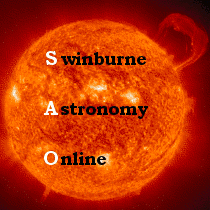Proton
Protons, together with neutrons, are the constituents of atomic nuclei. A hydrogen atom, for instance, is composed of a single proton orbited by a single electron. Unlike their neutral cousins, neutrons, protons are electromagnetically charged, and have charge opposite to that of an electron: they are positively charged. Hence in an atom, the negatively charged electrons orbit the positively charged nucleus.
Protons are not fundamental particles, but are composed of 3 quarks with flavours up, up and down. The up quark has a charge of +2/3 and the down quark -1/3 resulting in a net charge of 2/3+2/3-1/3=1. They are attracted to neutrons via the strong nuclear force, which is a consequence of the interactions between their quark constituents.
The mass of a proton is 1.6726231 × 10-27 kg.
The charge of a proton is 1.60217733 × 10-19 C. (where C is a Coulomb)
Study Astronomy Online at Swinburne University
All material is © Swinburne University of Technology except where indicated.

